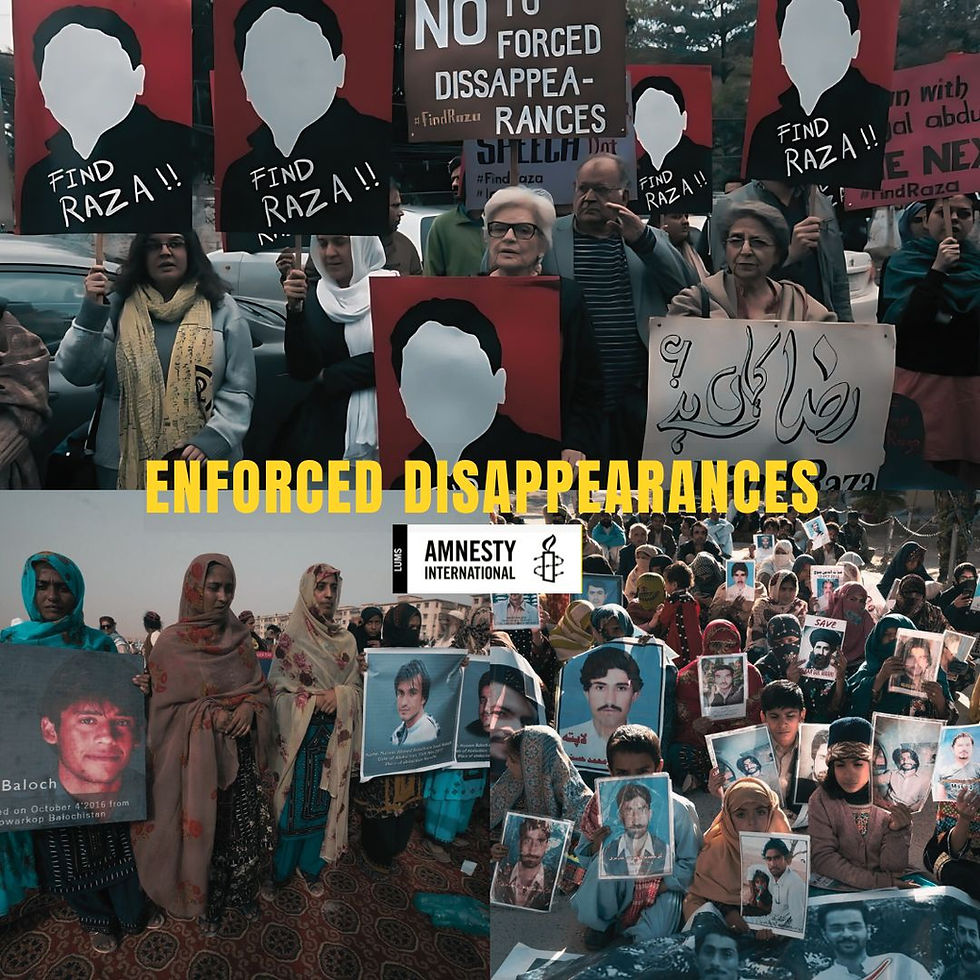Enforced Disappearances in Pakistan: A Continuing Crisis
- Zawar Hussain
- Aug 17, 2024
- 2 min read
By Zawar Hussain

Enforced disappearances in Pakistan remain a critical issue, affecting thousands of individuals and their families. Despite national and international attention, the practice continues unabated. This post examines the state of enforced disappearances in 2024, highlighting recent trends and impacts.
Overview and Recent Trends
Enforced disappearances involve the abduction of individuals by state agents or groups acting with their support, followed by a denial of their whereabouts. These practices are often used to silence dissent, particularly in Balochistan and Khyber Pakhtunkhwa. As of March 2024, over 8,000 cases have been reported, with around 2,000 still unresolved.
This year, the situation has escalated. According to the Human Rights Commission of Pakistan (HRCP), 350 new cases were recorded in the first quarter of 2024, a significant rise from previous years. Worryingly, such cases are now emerging in urban centers like Karachi and Lahore, often involving political activists and journalists. Notable cases include Mahrang Baloch’s father, journalist Imran Riaz Khan, Asad Toor, and Feroz Baloch, whose disappearances have drawn significant public and media attention.
Impact on Families
The impact on the families of the disappeared is devastating. The psychological trauma, coupled with economic hardship, is overwhelming, particularly for women who often become the sole providers. A 2023 study highlighted that these families experience prolonged distress and often face social stigma, compounding their challenges.
Legal and Judicial Developments
Pakistan’s legal framework has historically struggled to address enforced disappearances effectively. However, 2024 has seen crucial judicial responses. In February, the Supreme Court ordered the government to produce a detailed report on all unresolved cases, a significant step toward accountability. Additionally, special tribunals have been established to expedite hearings, though they face challenges like resource shortages and political interference.
International Pressure
International attention has intensified in 2024, with the UN Working Group on Enforced or Involuntary Disappearances expressing concern over the rising numbers. The group urged Pakistan to take immediate action and ratify the International Convention for the Protection of All Persons from Enforced Disappearance, which Pakistan has yet to sign.
Conclusion
Enforced disappearances in Pakistan were once largely confined to regions like Balochistan and Khyber Pakhtunkhwa. However, this alarming practice has now spread to other areas, including Punjab, making it a nationwide crisis. The growing number of cases nationwide is a clear sign that this issue needs urgent attention. It is not enough to rely on isolated efforts; a united response is needed to address this crisis. Families across Pakistan are suffering, and it is time for all of us to come together to demand justice and ensure the safety of every citizen.





Comments